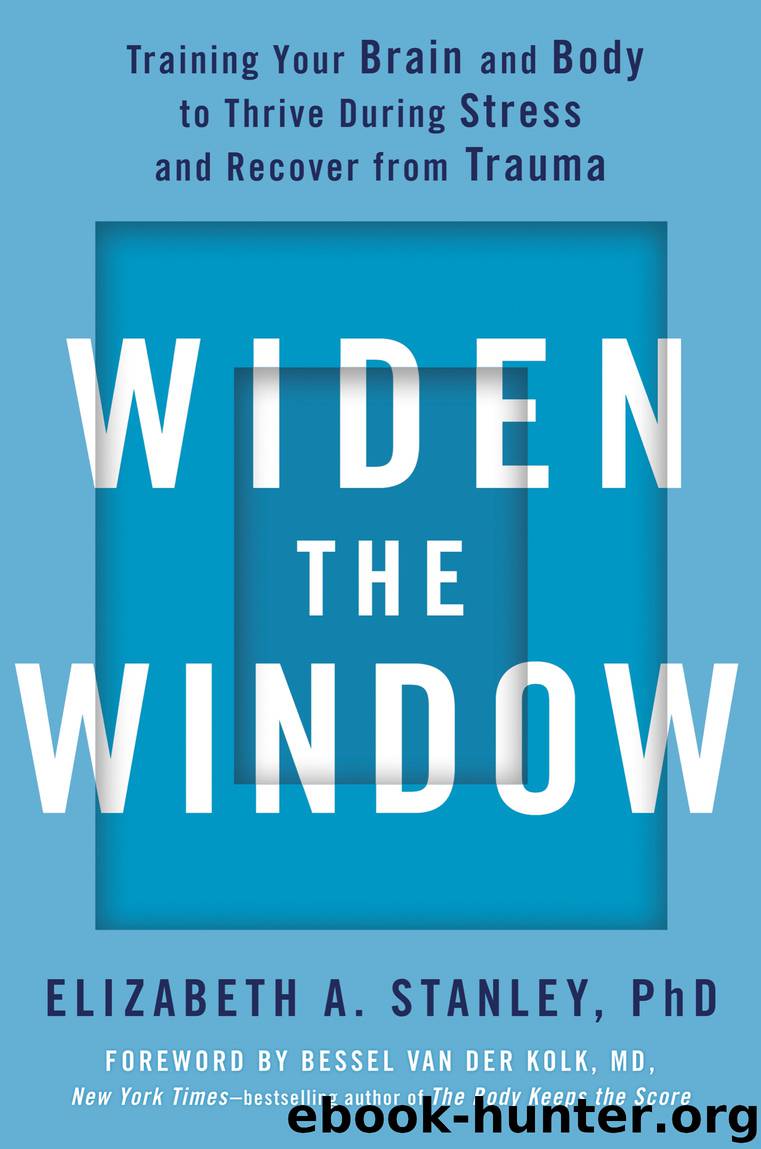Widen the Window by Elizabeth A. Stanley PhD & Bessel van der Kolk M.D

Author:Elizabeth A. Stanley, PhD & Bessel van der Kolk, M.D.
Language: eng
Format: epub
Publisher: Penguin Publishing Group
Published: 2019-09-23T16:00:00+00:00
Figure 13.1: Widening the Window through Full Recovery
This figure depicts how we can widen our neurobiological window of tolerance to stress activation. When we experience stress or trauma that take us outside our comfort zone, followed by a complete recovery, we create a wider window.
In contrast, when we experience significant stress outside our comfort zone without a complete recovery, over time our resilience gets undermined. This can happen through a shock trauma that overwhelms the mind-body system all at once. Or it can happen through chronic stress or relational trauma that slowly depletes our resources over time. In either situation, if the PSNS recovery functions don’t occur, our mind-body system gets conditioned to leave stress arousal turned on without ever turning it off. As a result, allostasis stops functioning properly.
That’s when our window narrows—and we’re more likely to exceed our stress capacity threshold, with four common consequences, as Chapter 10 explained. Each of these serves as an “alert” to warn us that complete recovery has not occurred. First, we’re more likely to behave in ways that work against our values and goals, such as by procrastinating, acting out, or engaging in unethical behavior. Our lifestyle choices start to reflect the narrowed attentional focus of chronic stress arousal and we prioritize the immediate over the truly important.
Second, even in the face of “minor” stressors, we’re more likely to rely on our default programming or automatically fall back to fight, flight, or freeze—rather than choosing the defensive strategy that’s most appropriate for the current situation. For instance, that’s when we might numbly acquiesce to a situation that’s harmful to us or others, when standing our ground or enlisting help from others would actually be a more appropriate response.
Third, our thinking brain and survival brain end up in an adversarial relationship, with faulty neuroception, degraded thinking brain functions, and impaired social engagement—which decreases our ability to interact cooperatively with others. With impaired social engagement, for example, we’re more likely to argue, interrupt others, become sarcastic or coercive, stop communicating, or withdraw. With an adversarial relationship, we’re also more likely to experience survival brain hijacking, in which emotions and stress arousal drive our decision making and behavior. Conversely, we’re also more likely to experience thinking brain override in its various forms, including suppression, denial, compartmentalization, and suck it up and drive on.
Finally, we tend to fall into stress reaction cycle habits, which may help us feel better in the short term but actually add to our allostatic load. For instance, we might rely on caffeine, sugar, nicotine, alcohol, or illegal, over-the-counter, or prescription drugs to increase or decrease our arousal and mask stress symptoms. Or we might overeat, skip meals, or choose unhealthy or fast food. We might use television, mobile devices, the Internet, or video games to numb or distract ourselves. Or we might compulsively engage in self-harming, high-risk, or adrenaline-seeking behaviors, such as cutting, extreme sports, gambling, aggressive driving, or infidelity. We might also rely on thinking brain habits such as chronic worrying, planning, or ruminating.
Download
This site does not store any files on its server. We only index and link to content provided by other sites. Please contact the content providers to delete copyright contents if any and email us, we'll remove relevant links or contents immediately.
Inner Engineering: A Yogi's Guide to Joy by Sadhguru(6796)
The Power of Now: A Guide to Spiritual Enlightenment by Eckhart Tolle(5784)
Fear by Osho(4740)
Ikigai by Héctor García & Francesc Miralles(4275)
The Art of Happiness by The Dalai Lama(4130)
The Ultimate Bodybuilding Cookbook by Kendall Lou Schmidt(3945)
Yoga Therapy by Mark Stephens(3749)
The Little Book of Hygge by Meik Wiking(3694)
The Healing Self by Deepak Chopra(3580)
Why Buddhism is True by Robert Wright(3454)
The Hatha Yoga Pradipika (Translated) by Svatmarama(3343)
Being Aware of Being Aware by Rupert Spira(3277)
Shift into Freedom by Loch Kelly(3199)
Wild Words from Wild Women by Stephens Autumn(3153)
Work Clean by Dan Charnas(3123)
Happiness by Matthieu Ricard(3050)
More Language of Letting Go: 366 New Daily Meditations by Melody Beattie(3030)
Yoga Body & Mind Handbook by Jasmine Tarkeshi(2880)
Why I Am Not a Feminist by Jessa Crispin(2760)
